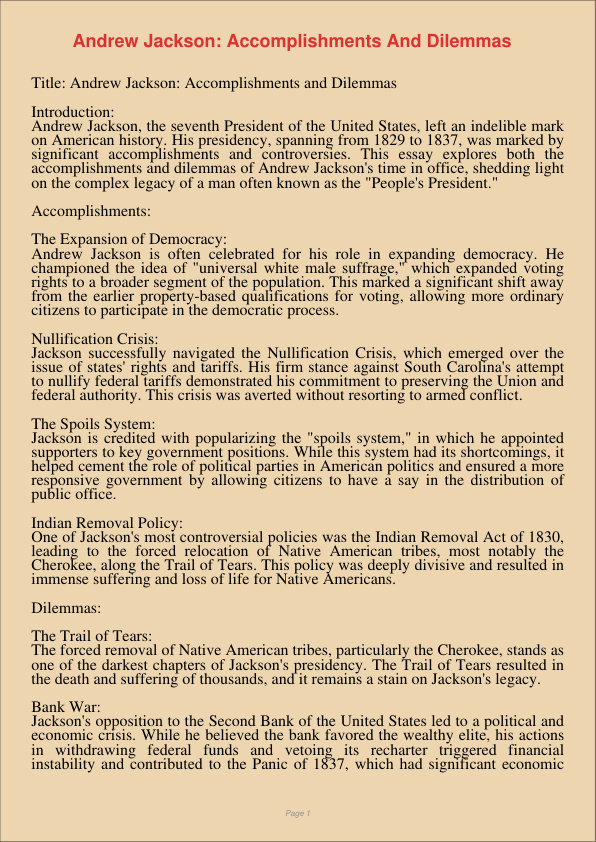Title: Andrew Jackson: Accomplishments and Dilemmas
Introduction: Andrew Jackson, the seventh President of the United States, left an indelible mark on American history. His presidency, spanning from 1829 to 1837, was marked by significant accomplishments and controversies. This essay explores both the accomplishments and dilemmas of Andrew Jackson’s time in office, shedding light on the complex legacy of a man often known as the “People’s President.”
Accomplishments:
The Expansion of Democracy: Andrew Jackson is often celebrated for his role in expanding democracy. He championed the idea of “universal white male suffrage,” which expanded voting rights to a broader segment of the population. This marked a significant shift away from the earlier property-based qualifications for voting, allowing more ordinary citizens to participate in the democratic process.
Nullification Crisis: Jackson successfully navigated the Nullification Crisis, which emerged over the issue of states’ rights and tariffs. His firm stance against South Carolina’s attempt to nullify federal tariffs demonstrated his commitment to preserving the Union and federal authority. This crisis was averted without resorting to armed conflict.
The Spoils System: Jackson is credited with popularizing the “spoils system,” in which he appointed supporters to key government positions. While this system had its shortcomings, it helped cement the role of political parties in American politics and ensured a more responsive government by allowing citizens to have a say in the distribution of public office.
Indian Removal Policy: One of Jackson’s most controversial policies was the Indian Removal Act of 1830, leading to the forced relocation of Native American tribes, most notably the Cherokee, along the Trail of Tears. This policy was deeply divisive and resulted in immense suffering and loss of life for Native Americans.
Dilemmas:
The Trail of Tears: The forced removal of Native American tribes, particularly the Cherokee, stands as one of the darkest chapters of Jackson’s presidency. The Trail of Tears resulted in the death and suffering of thousands, and it remains a stain on Jackson’s legacy.
Bank War: Jackson’s opposition to the Second Bank of the United States led to a political and economic crisis. While he believed the bank favored the wealthy elite, his actions in withdrawing federal funds and vetoing its recharter triggered financial instability and contributed to the Panic of 1837, which had significant economic repercussions.
Slavery and Racism: Jackson’s presidency also saw the expansion of slavery in the American South. He owned slaves himself and played a role in the annexation of Texas, which further deepened the debate over slavery and contributed to the tensions leading to the American Civil War.
Presidential Power: Jackson’s use of the presidential veto and the expansion of executive authority raised concerns about the concentration of power in the presidency, which remains a point of contention in American political history.
Conclusion:
Andrew Jackson’s presidency was marked by both accomplishments and dilemmas. He expanded democracy, successfully managed the Nullification Crisis, and popularized the spoils system, but his legacy is marred by the forced removal of Native Americans, his economic policies, and his stance on slavery. Jackson remains a polarizing figure in American history, exemplifying the complexities and contradictions of the nation’s past. His presidency is a reminder that leaders are often remembered for a combination of their positive contributions and the dilemmas they faced and, at times, exacerbated.

「真诚赞赏,手留余香」
真诚赞赏,手留余香
使用微信扫描二维码完成支付
